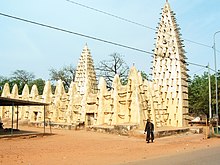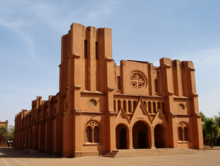Religion in Burkina Faso
Religion in Burkina Faso (2019 census)[1]
| Part of a series on the |
| Culture of Burkina Faso |
|---|
 |
|
People |
| Languages |
| Cuisine |
| Religion |
| Art |
|
Literature |
| Music |
| Sport |


The vast majority of
Statistics
Statistics on religion in
Statistics on religious affiliation are approximate because Syncretism, incorporating traditional indigenous beliefs and practices, is widespread among both Christians and Muslims.[4] The majority of citizens practice traditional indigenous religious beliefs to varying degrees, and strict adherence to Christian and Muslim beliefs is often nominal.[3] Almost all citizens are believers, and atheism is virtually nonexistent. One 2015 study estimates some 200,000 Christian believers from a Muslim background in the country, though not all are citizens.[5][6]
| Census Year | Muslims | Christians | Catholics | Protestants | Animists | Other / None |
|---|---|---|---|---|---|---|
| 2006[7] | 60.5% | 23.2% | 19.0% | 4.2% | 15.3% | 1.0% |
| 2019[1] | 63.8% | 26.3% | 20.1% | 6.2% | 9.0% | 0.9% |
| Growth | 3.3% | 3.1% | 1.1% | 2.0% | -6.3% | -0.1% |
Geography
Muslims reside largely around the northern, eastern, and western borders, while Christians live in the center of the country. People practice traditional indigenous religious beliefs throughout the country, especially in rural communities.
Ethnicity
In 2010, there were more than 60 different
Freedom of religion
In 2023, Open Doors ranked Burkina Faso as the 23rd worst country to be a Christian.[10] It also scored 3 out of 4 for religious freedom.[11]
See also
- Islam in Burkina Faso
- Christianity in Burkina Faso
- Roman Catholicism in Burkina Faso
- Freedom of religion in Burkina Faso
References
- ^ a b c d e f g Aib, Az (2022-07-01). "Burkina : 48,1% de la population du Sud-ouest pratique l'Animisme (officiel)". AIB - Agence d'Information du Burkina (in French). Retrieved 2022-10-16.
- ^ a b c Comité national du recensement (July 2008). "Recensement général de la population et de l'habitation de 2006" (PDF). Conseil national de la statistique. Archived from the original (PDF) on 11 May 2011. Retrieved 20 January 2011.
- ^ Bureau of Democracy, Human Rights and Labor. November 17, 2010. Archived from the original on November 23, 2010. This article incorporates text from this source, which is in the public domain.
- ^ US State Dept 2022 report
- ^ Johnstone, Patrick; Miller, Duane A (2015). "Believers in Christ from a Muslim Background: A Global Census". IJRR. 11: 14. Retrieved 20 November 2015.
- ^ "Enquête Démographique et de Santé et à Indicateurs Multiples (EDSBF-MICS IV) 2010" (PDF). April 2012.
- ^ a b "Burkina Faso: Preserving the Religious Balance". www.crisisgroup.org. 2016-09-06. Retrieved 2022-10-19.
- ^ a b "Burkina Faso". United States Department of State. Retrieved 2022-10-16.
- ^ US State Dept 2022 report
- ^ Open Doors website, Retrieved 2023-08-01
- ^ Freedom House website, Retrieved 2023-08-01

